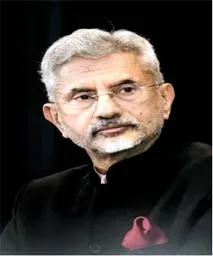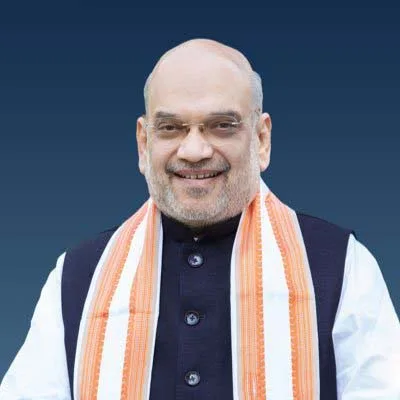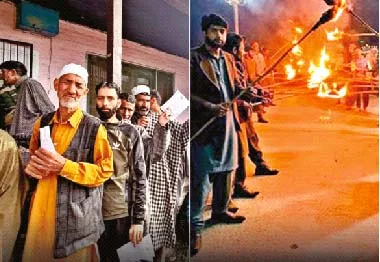The picture of Jammu–Kashmir has totally changed after the abrogation of Article 370. The Union Territory is on the path of development and youth are getting opportunities. On the other hand, people in Pakistan occupied Jammu and Kashmir (PoJK) are struggling to fulfill their needs from soaring inflation to rampant unemployment to lack of basic services. As a result, people are now raising their voices against the Pakistan Army and the Government, who have been surpassing their voices for many decades. However, in last few years, people are standing up to Pakistan Army and its intelligence wing Inter-Services Intelligence. As economic crisis growing day by day in Pakistan, the Government has left the people on their own.
PoJK, synonymous with scenic beauty as well as strategic significance, is now in the spotlight due to a series of escalating protests that have gripped the region since the start of 2024. The protests in PoJK show no signs of abatement. The situation remains tense, with violent clashes between protestors and security forces. Pakistan Government is faceing mounting international pressure to address the root causes of unrest and find a peaceful resolution to the crisis. What began as demonstrations over economic grievances including rising inflation in food, electricity bills and taxes have now morphed into a significant political crisis. The demonstrstion traces its origin to May 2023 when a massive spike in electricity tariffs and rise in prices of flour resulted in angry demonstrations and protests. By August 2023, things started boiling over in PoJK. Protestors in Rawalakot burnt their electricity bills and declared a civil disobedience movement. The response from the Pakistani military and the Pakistan Rangers has been harsh, with reports of crackdowns, suppression of peaceful protests and arbitrary detentions.

“These days, a lot of things are going on in PoK. You must have seen some incidents happening there. Now, (the) Modi government, we are very clear on this… We are very clear that PoK is a part of India. It is a part of India, it was always part of India, it will be part of India” — S Jaishankar, External Affairs Minister
Several incidents of use of force and human rights violations has been reported in recent days. In Muzaffarabad, the capital, police reportedly used tear gas and shelling in residential areas, resulting in injuries to innocent people, including women and children.
Initial Outbreak of Protests
In April 2024, the streets of PoJK saw the first waves of protests by citizens. The protesters showcased their anger due to soaring inflation, rampant unemployment and lack of basic services. These initial demonstrations were relatively small but quickly gained momentum as people from various towns joined in.

“PoK is part of India and it will be taken back from Pakistan. After the abrogation of Article 370 by the Central government in 2019, peace has returned to Kashmir. But now we are seeing protests in Pakistan-occupied Jammu–Kashmir. Earlier, slogans of azadi (freedom) were heard here. Now, the same slogans are heard in PoK. Earlier, stones were pelted here. Now, stones are pelted in PoK”— Amit Shah, Union Home Minister
By early May, protests had spread to major cities across PoJK. The movement grew in size and scope, encompassing demands for political reforms and greater autonomy alongside economic issues. The diverse composition of the protestors, cutting across social and economic lines, added strength to the movement and heightened the urgency of their demands. Notably, protestors organised Jammu and Kashmir Joint Awami Action Committee (JKJAAC), which called for a shutter-down and wheel-jam strike in Muzaffarabad. Local leaders and activists formed these committees, aiming to coordinate the protests more effectively. The turning point came in late April when protest leaders announced a long March to Muzaffarabad, the capital of PoJK. This bold move was intended to draw greater attention to their demands. The march was planned to culminate in a major rally in the capital, symbolising the unity and determination of the protestors. By early May, preparations for the long March were in full swing. Protestors from various regions began converging on the planned route, with volunteers and local supporters organising logistics such as food, water, and medical supplies. The long march gained significant media attention, further amplifying the protestors’ message. In the second week of May, thousands of protestors embarked on the long March towards Muzaffarabad.
Brutal force against Protesters
As the marchers approached Muzaffarabad, tensions escalated. Security forces were deployed to block the protestors, leading to skirmishes and arrests. These initial clashes marked a significant escalation in the crisis, highlighting the growing divide between the protestors and the authorities. The Government intensified its crackdown on the protestors. Curfews were imposed in major cities, and the presence of security forces was ramped up. Protestors faced heavy resistance and brute force as the authorities attempted to quell the unrest. Pakistan Government’s heavy-handed response only served to fuel the protestors’ determination. Due to brute response by the protestors, clashes intensified and one of the policemen was killed in clashes between people and police. The situation took a tragic turn when reports emerged of police firing live ammunition at protestors. As per media reports, at least four individuals were killed recently and more than 100 were injured. According to security Analysts, other reasonds of rising anger against Pakistan by the people of PoJK is the heavy military presence in this area. Population density is being forcibly altered and people are forced to accept terrorists and their training camps in their midst. Land is being grabbed and resources exploited to satisfy the demands of Pakistan’s Punjab. The residents of PoJK are considered third-class citizens in Pakistan.
People of J&K are on the path of progress and to match this, Pakistan is trying to drag attention of people in PoJK by giving them a small package. However, the people of PoJK have made up their mind for freedom. Pakistan, which has illegally occupied this area, will have to abandon. The residents of PoJK deserve the same facilities and opportunities that their brothers and sisters enjoy in J&K.



















Comments